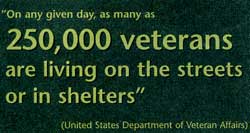 Homeless veteran returns to service at shelter
Homeless veteran returns to service at shelter
by Ryan Teague Beckwith
RALEIGH, N.C. – As he walks the concrete hallways of the South Wilmington Street homeless shelter, Robert Durr snaps a crisp salute to the men who pass. If one salutes back, he knows that man is a veteran, too.
It is a subtle way of inviting them into the tightknit circle there of homeless men such as himself who have served in the military. But it is also an old habit for the former sergeant.
“A salute is a sign of respect,” he said.
Since September, Durr has been one of the unofficial leaders of the shelter’s veterans.
With Carolina blue eyes and a husky voice, the 55-year-old comes across as the group’s older brother, dispensing tips on who is hiring now or how to get a meal ticket at the veterans hospital in Durham.
The men call him “Gunny,” short for gunnery sergeant, his rank when he left the Marine Corps in 1978…
A lot of men return his salutes. Nearly one in five who stayed at the shelter in 2006 were veterans, according to county records. Seven percent refused to answer the question when they arrived.
That means about two dozen of the 124 men staying in the shelter’s long-term program at any given time are veterans. Others stay in the shelter’s 110 emergency beds, which are filled by a lottery each night.
The figure is slightly low, compared with the national average of 33 percent of homeless men, according of the National Coalition for Homeless Veterans.
John Driscoll, vice president of the coalition, said that veterans are more likely to have drug and alcohol problems, traumatic experiences that can trigger depression, and job skills that don’t translate well.
Military service also can mask pre-existing problems.
“You make the choice to serve, but from the time you raise your hand, they’re deciding where you go and how long you’ll be there,” he said. “When you go back to the civilian world, you have to learn to be on your own.”
Durr’s homelessness came about from a combination of problems. He served for a decade, including combat tours in Vietnam. The experience left him leery of making friends or going to social events. An alcohol problem went unchecked until he went to prison for drunken driving last year.
“I lost everything,” he said. “I was getting ready to give up.”
Instead, he moved into the long-term program at the shelter on Wilmington Street, just south of downtown. He got counseling, applied for jobs and joined a veterans support group that meets every other Tuesday.
The group is organized by Frank Lawrence, a 20-year Army veteran and a social worker at the shelter for the past year. But once the meetings start, Durr and other older vets often take over the discussion.
Most of the veterans at the shelter served during the Vietnam War era. Korean War veterans who were homeless have either died or moved into senior housing. A handful from the first Iraq war and even one from the conflict in Afghanistan have shown up.
They give each other practical advice about getting benefits or lining up a job. The conversation rarely touches on the emotional issues the men face, although combat veterans occasionally make small talk about their experiences.
In recent months, the group has become active in the community as well.
The men have gone to a Carolina Mudcats minor league baseball game in Zebulon. Some went to a Veterans Day parade in Raleigh. The next Saturday, the group went to the Harris Teeter grocery store in Cameron Village to collect donations for a food bank.
The men wore matching gray T-shirts with the emblems of the Army, Air Force, Navy and Marines that said “South Wilmington Street Center Veterans Support Group.” Few shoppers realized where they lived.
“We weren’t there as homeless people,” Durr said. “We were there as veterans.”
Within a few hours, the men had gathered nearly 1,000 pounds of food. There wasn’t enough room left over in the county van for the men to ride back to the shelter, and they had to wait for a second van to pick them up.
His eyes welling, Durr said that it felt good to help people less fortunate than himself.
“That’s the best I’ve felt in a long time,” he said.
ATTENTION READERS
We See The World From All Sides and Want YOU To Be Fully Informed
In fact, intentional disinformation is a disgraceful scourge in media today. So to assuage any possible errant incorrect information posted herein, we strongly encourage you to seek corroboration from other non-VT sources before forming an educated opinion.
About VT - Policies & Disclosures - Comment Policy



